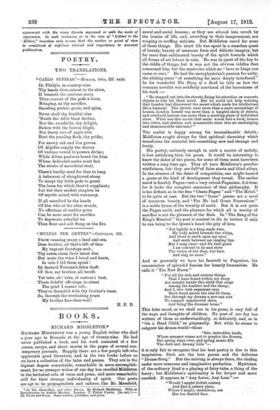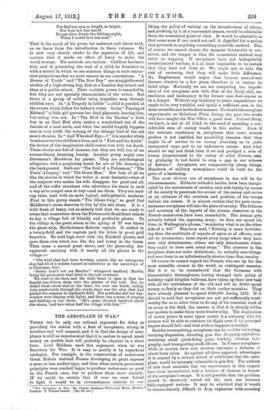B 0 O K S.
.RICHARD MIDDLETON.*
RICHARD MIDDLETON was a young English writer who died a year ago in Brussels at the age of twenty-nine. He had never published a book, and his work consisted of a few poems, essays, and short stories -in the pages of several con- cemporary journals, Happily there are a few people left who appreciate good literature, and in the two books before us we have a collection of the tales and poems. They are in the highest degree remarkable; remarkable in mere aecomplish- anent, for no younger writer of our day has excelled Middleton in the:technical arts of verse and prose, and more remarkable still for their strange individuality of spirit. ' Our poets ore apt to be propagandists and enforce, like Mr. Masefield, *-ro The Ghost-Ship, and other Stories. By Richard Middleton. With an gntroductiou by Arthur Machen. London : T. Fisher I/1min. (2) Poems and Songs. Same author, publisher, and price. '
moral and social lessons ; or they are stirred into revolt by the ironies of life, and, according to their temperament, are weeping or scoffing satirists. But Middleton cared for none of these things. His short life was spent in a ceaseless quest of beauty, beauty of sensuous form and delicate imagery, but far more that sublimated beauty of the spirit towards which all forms of art labour in vain. He was in quest of the key to the riddle of things, but it was not the obvious riddles that
concerned him, but the mysteries which no "laws or kings can cause or cure." He had the-metaphysician's passion for unity, the abiding sense " of something far more deeply interfused." In his wonderful The Story of a Book he tells us how the common novelist was sudcfenly convicted of the barrenness of
his work :--
" He stepped out into the streets, fixing his attention on concrete objects to rest his tired mind. But he could not help noticing that London had discovered the secret which made his intellectual life a torment. The-streets were more than a mere assemblage of houses, London herself was more than a tangled skein of streets, and overhead heaven was more than a meeting-place of individual stars. What was this secret that made words into a book, houses into cities, and restless and measurable stars into an unchanging and immeasurable universe ? "
And so presently, we have his farewell to Paganism, his renunciation of splendid fancies for homely humanities. He calls it " The New Dawn."
"For all the rich and curious things
That I have found within my sleep Are nought beside this child that sings Among the heather and the sheep ; And I, who with expectant eyes Have fared across the star-lit foam, See through my dreams a new sun rise To conquer unachieved skies,
And bring the dreamer home."
This later mood, as we shall see in his prose, is very full of the ways and thoughts of children. No poet of our day has written of them so understandingly, so delicately, and, as in "On. a Dead Child," so poignantly. But while he seems to outgrow his dream-world--those
"fair, untrodden lands, Where summer comes not to perplex the flowers, But spring stays ever, and spring music ails The dark and dreamy hills " — it is only fair to recognize that his best poetry is due to this inspiration. Such are the love poems and the delicious
" Dream-Song." But the striving is always there, the chafing under more sensuous and imaginative perfection. Mysticism of the ordinary kind is a playing at fairy-tales, a thing of the fancy ; bat Middleton's spirituality is far deeper and more rarefied. It appears in " Any Lover, Any Lass "
" Would I might forfeit ecstasy And find a calmer place, Where I might, undesirous, see Her too desired face.
The realist is happy among his inconsiderable details; Middleton sought always for that spiritual chemistry which transforms the material into something new and strange and lovely.
His poetry, curiously enough in such a master of melody, is less satisfying than his prose. It would be interesting to know the dates of the pieces, for some of them must have been written a long time ago. They all have Middleton's peculiar wistfulness, but they are full•of false starts and blind alleys. In the absence of the dates of composition, one might hazard a guess at the kind of development they reveal. The earlier mood is frankly Pagan—not a very robust Paganism, it is true,
for It -lacks the complete assurance of that philosophy. It is too defiant, as in the fine" Cheat-Fagan " and " The Rebel,"
to be quite at ease. But the two "Irene" poems are a revel of sensuous beauty, and " For He had Great Possessions" is a noble hymn of the worship of earth. But it is not quite the Pagan earth, and the pleasure for which all is worthy of sacrifice is not the pleasure of the flesh. In " The Song of the King's Minstrel " the poet is content to die in torture if only he can bring to the Queen's heart the pity of love.
"Not lightly is a king made wise,
101. My body ached beneath the whip; And there is earth upon my eyes, And earth between my singing lips. But I sang once—and for that grace I am content to lie and store
The vision of her dear, wet face, And sing no more."
Nor find her eyes so bright, so bright, Nor hear her lips unroll Dream after dream the lifelong night, When I would love her soul."
That is the mood of his prose, his maturest and latest work, as we learn from the introduction to these volumes. He is now very clearly awake to the mysteries of life, and realizes that it needs no effort of fancy to make the world strange. His methods are various. Children fascinate him, and in presenting the soul of a child he furnishes us with a mirror in which we see common things in such uncom- mon proportions that we grow uneasy in our conventions. "A Drama of Youth " and " The New Boy" are straightforward studies of a high-strung boy, first at a London day-school and then at a public school. Their realistic power is remarkahle, but they are not specially characteristic of the writer. But there is a group of subtler tales, tragedies seen through childish eyes. In "A Tragedy in Little" a child is puzzled at the events which follow his father's crime. In the " Passing of Edward " a little girl pursues her dead playmate, bearing him, hat seeing him not. In " The Bird in the Garden" a little boy in an East End slum makes a wonderland out of the fancies of a mad uncle, and when the sordid tragedy happens sees in very truth the coming of the strange bird of the old man's dreams. In " And Who shall Say— P " it is murder which breaks across two children's lives, and in " Fate and the Artist" the fiction of the imaginative child comes true with his death.
These stories are full of humour, but they are full, too, of an extraordinary haunting beauty. Another group might own Stevenson's lifarkheinb for parent. They are psychological allegories, with a perplexing moral for art or life dancing in the background. Such are "The Soul of a Policeman," "The Poets' Allegory," and " The Great Man." But best of all we like the stories in which the writer is most fantastic—that of the conjurer who makes his wife disappear for good and all, and of the coffin merchant who advertises his wares in such a way as to compel men to buy—and use them. They are mad- cap tales, mad with an eerie, logical, unforgettable madness.
First in this group stands "The Ghost-Ship," so good that Middleton's name deserves to live by this tale alone. It is a wild freak of fancy, but so soberly told that we are ready to swear that somewhere down the Portsmouth Road there stands to-day a village full of friendly and profitable ghosts. To the village in the great storm in the spring of '97 was blown the ghost-ship, Bartholomew Roberts captain. It settled in a turnip-field, and the captain paid the debts in great gold brooches. He held high revel with the Fairfield ghosts, and gave them rum which was like fire and honey in the bones. Then came a second great storm, and the ghost-ship dis- appeared, carrying with it nearly all the ghosts in the -village :— "The wind that had been howling outside like an outrageous dog had all of a sudden turned as melodious as the carol-boys of a Christmas Eve.
' Surely that's not my Martha!' whispered landlord, Martha 3being his great-aunt that lived in the loft overhead.
We went to the door, and the wind burst it open so that the .handle was driven clean into the plaster of the wall. But we didn't think about that at the time; for over our heads, sailing -very comfortably through the windy stars, was the ship that Lad `passed the summer in landlord's field. Her portholes and her bay- .window were blazing with lights, and there was a noise of singing and fiddling on her decks. He's gone,' shouted landlord above the storm, 'and he's taken half the village with him!"







































 Previous page
Previous page